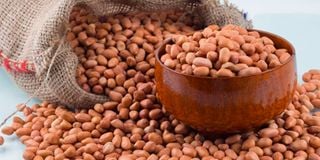Premium
Protect consumers from poisonous food

Processed foods containing groundnut (or peanut) are usually more contaminated than whole nuts. This is probably because visibly damaged nuts are more likely to contain aflatoxin, and the best nuts are sold whole rather than processed.
Over the years, Kenya has seen an increase in cases of foodstuff containing aflatoxin and other harmful substances being pulled down from the shelves in supermarkets and retail shops.
There have been exposés about the presence of aflatoxin in some popular brands of maize flour, which is worrying because ugali is the staple for most Kenyans.
Poisonous foods have been a major cause of diseases and it is time regulators stepped up their efforts to rid the shelves of contaminated food substances.
While aflatoxin is a known carcinogen and can be fatal if consumed in large quantities, the potential health impacts of consuming moderate amounts over a long time are less understood.
More resources need to be allocated to dealing with aflatoxin contamination at its root, which is on the farm, and towards the testing of inputs before buying.
Food contamination is a global problem; it is not unique to Kenya. Farmers should be educated about and encouraged to adopt practices that reduce the risk of contaminating foodstuff, such as proper drying of grains on plastic sheets and storing the well-dried ones in hermetic bags.
Aflatoxin regulation
There also needs to be a change in Kenya’s aflatoxin regulation to legalise the use of contaminated grain for specific non-food uses. The East African standard for maize, which Kenya follows, requires all maize to meet the same aflatoxin limit regardless of its use.
Since very little aflatoxin is passed from feed to meat, crops that are considered unsafe for human consumption can be safely used to feed animals to be slaughtered for meat. Many countries, including the US and EU members, allow higher levels—up to 30 times the Kenyan limit—in such feed.
Allowing food that exceeds the aflatoxin limit for human consumption to be fed to meat animals as feeds is a way to get this poison out of the food supply.
People who grow their own maize or groundnuts should dry their crops thoroughly while preventing contact with the soil and store them in a clean dry place.
Processed foods containing groundnut (or peanut) are usually more contaminated than whole nuts. This is probably because visibly damaged nuts are more likely to contain aflatoxin, and the best nuts are sold whole rather than processed. Grinding your own peanut butter from high-quality nuts is one way to avoid aflatoxin in this food.
To avoid aflatoxin, eat a balanced diet and avoid over-reliance on maize and groundnut.
Muturo Ndung'u, Nairobi



